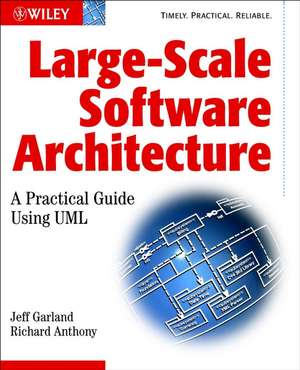Large–Scale Software Architecture: A Practical Guide using UML
Autor Jeff Garland, Richard Anthonyen Limba Engleză Paperback – 28 oct 2002
Large-Scale Software Architecture ist ein praktischer Leitfaden fr den Umgang mit UML.
Hier wird erlutert, wie man Softwarearchitektur als Tool benutzt, um die Entwicklung zu leiten, anstatt die architektonischen Einzelheiten zu erfassen, nachdem alle Designentscheidungen bereits getroffen wurden.
Der Band beschreibt genau, wie man UML fr gro angelegte Architekturen nutzt.
Erlutert Grundstze zu Softwarearchitektur und -Design.
Preț: 189.48 lei
Preț vechi: 254.09 lei
-25% Nou
Puncte Express: 284
Preț estimativ în valută:
36.26€ • 39.37$ • 30.46£
36.26€ • 39.37$ • 30.46£
Carte indisponibilă temporar
Doresc să fiu notificat când acest titlu va fi disponibil:
Se trimite...
Preluare comenzi: 021 569.72.76
Specificații
ISBN-13: 9780470848494
ISBN-10: 0470848499
Pagini: 280
Dimensiuni: 190 x 235 x 15 mm
Greutate: 0.52 kg
Editura: Wiley
Locul publicării:Chichester, United Kingdom
ISBN-10: 0470848499
Pagini: 280
Dimensiuni: 190 x 235 x 15 mm
Greutate: 0.52 kg
Editura: Wiley
Locul publicării:Chichester, United Kingdom
Public țintă
Software Architects working on large–scale software development projects.Notă biografică
Jeff Garland, President CTO, CrystalClear Software, Phoenix, AZ, USA.
Richard Anthony, Senior Software Architect, Object Computing Inc, Tempe, AZ, USA.
Jeff Garland has over 16 years experience as a software designer and architect. He currently consults, specializing in the development of software architecture for large-scale systems. Richard Anthony has over 17 years experience as a software designer and architect. He currently consults, specializing in CORBA and distributed systems.
Richard Anthony, Senior Software Architect, Object Computing Inc, Tempe, AZ, USA.
Jeff Garland has over 16 years experience as a software designer and architect. He currently consults, specializing in the development of software architecture for large-scale systems. Richard Anthony has over 17 years experience as a software designer and architect. He currently consults, specializing in CORBA and distributed systems.
Descriere
The purpose of large--scale software architecture is to capture and describe practical representations to make development teams more effective. In this book the authors show how to utilise software architecture as a tool to guide the development instead of capturing the architectural details after all the design decisions have been made.
